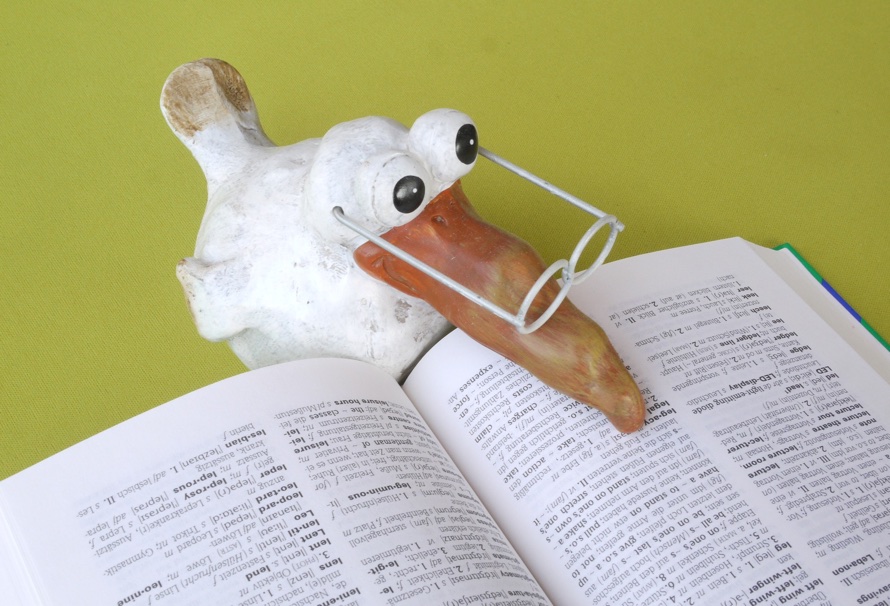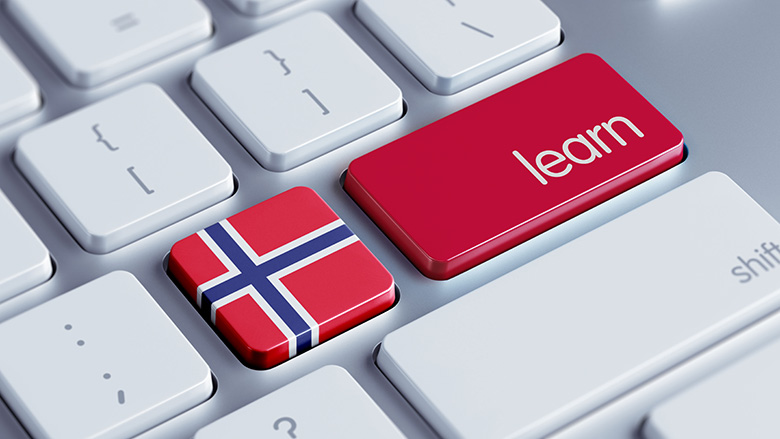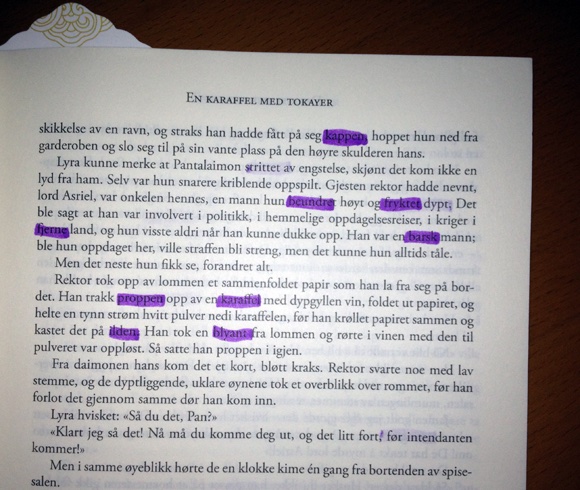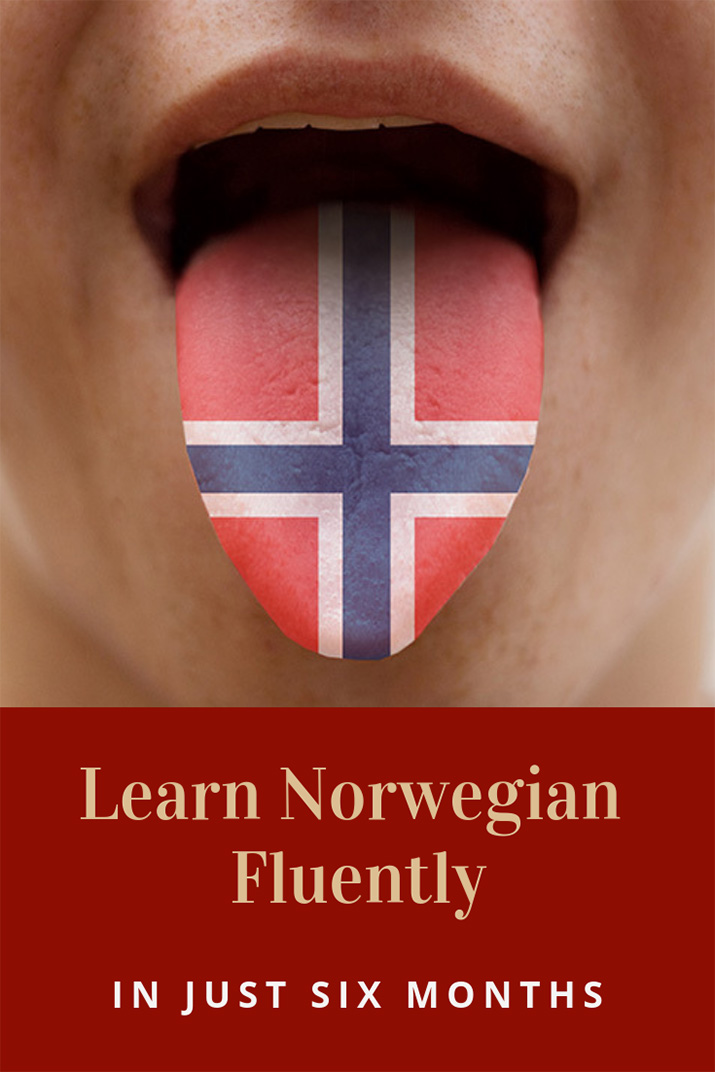
Is it really possible to become a fluent Norwegian speaker in just six months? One linguistics expert says it is.
English and the Scandinavian languages all come from the same root. They share similar structures, and even many words.
So why do native English speakers find it so hard to learn Norwegian when on paper it should be one of the easiest languages to learn?
Learn Norwegian Now: Norwegian Class 101 / The Mystery of Nils
The answer could lie in the fact that we’re just not doing it right. The way we teach languages in school strips the process of all utility – unless you really do need to give Monsieur Pompidou walking directions to Charles de Gaulle airport!
Anyone can do it
Psychologist and linguistics expert Chris Lonsdale explained in a TEDx talk that anyone can learn any language in just six months if they follow a few simple principles.
Over the course of his 18 minute talk, the New Zealander, who is fluent in both Mandarin and Cantonese, goes into a lot of history and detail about how he came to formulate his ideas into this system.
If you don’t have the time to watch the whole thing, I’ll summarise the key principles below.
Schools get in the way
Coming from an interest in speeding up learning, his first main observation was that school often gets in the way of learning. Schools are great for keeping kids occupied all day but they’re certainly not set up for efficient learning.
Via various false starts such as hypnopaedia – where you supposedly learn by listening while you’re asleep – it was when he decided he was going to defy the odds and learn Mandarin within two years that he started to hone his ideas. This was in the early 1980s when Mandarin was considered impenetrable to Westerners.
Having become fluent within six month, and native a little later, he looked around and saw that not only were English speakers struggling with Chinese but Chinese were struggling with English. So the question became
How can you help a normal adult learn a new language quickly, easily and effectively?
From here he worked out, using his background in psychology, that the best thing to do is to see what’s working and apply it to different situations, learning experiences and languages.

He then boiled it down to a core of five principles and seven actions.
Relevance
Language first and foremost is a communication tool. And like with any tool, you learn to use it best when you need to use it to accomplish something.
So, the first principle for learning a language is focus on language content that is relevant to you. If it’s related to your personal goals then you’re going to pay attention to it, if it’s relevant you’re going to remember it.
Learn Norwegian Now: Norwegian Class 101 / The Mystery of Nils
Language is a tool
The second principle for learning a language is to use your language as a tool to communicate from day one.
“I had a colleague many years ago who went to night school; Tuesday night, Thursday night, two hours each night, practicing at home, she spent nine months, and she did not learn to type Chinese.”
“One night we had a crisis. We had 48 hours to deliver a training manual in Chinese. And she got the job, and I can guarantee you in 48 hours, she learned to type Chinese because it was relevant, it was meaningful, it was important, she was using a tool to create value.”
Comprehensible input
The third principle for learning a language is that when you first understand the message, you will acquire the language unconsciously.
“When I first arrived in China I didn’t speak a word of Chinese, and in my second week I spent eight hours sitting in the dining car of an overnight train talking to one of the guards. We chatted all night in Chinese and he was drawing pictures and making movements with his hands and facial expressions and piece by piece by piece I understood more and more.”

“Two weeks later, when people were talking Chinese around me, I was understanding some of this and I hadn’t even made any effort to learn that. What had happened, I’d absorbed it that night on the train.”
Language deafness
Our fourth principle is that if you can’t hear it, you won’t understand it. If you can’t understand it, you’re not going to learn it.
“A woman I know from Taiwan did great at English at school, she got A grades all the way through, went through college, A grades, went to the US and found she couldn’t understand what people were saying. And people started asking her: ‘Are you deaf?’ And she was. English deaf. Because we have filters in our brain that filter in the sounds that we are familiar with and they filter out the sounds of languages we’re not.”
State
Our fifth and final principle is to make sure you’re in the right state to learn. If you're sad, angry, worried, upset, you’re not going to learn. Period.
“If you’re happy, relaxed, in an Alpha brain state, curious, you’re going to learn really quickly, and very specifically you need to be tolerant of ambiguity. If you’re one of those people who needs to understand 100% every word you’re hearing, you will go nuts, because you’ll be incredibly upset all the time, because you’re not perfect.”
“If you’re comfortable with getting some, not getting some, just paying attention to what you do understand, you’re going to be fine, you’ll be relaxed and you’ll be learning quickly.”
Seven action steps
So based on those five principles – and remember these apply to learning anything, not just languages – Chris recommends seven actions to take that will help you apply these principles to learn a language.
Listen a lot – Chris calls this ‘Brain Soaking’ and basically it involves just exposing yourself to the language, even without understanding, and listen out for patterns and sounds that repeat. You’ll pick up a lot of information without even knowing it
Get the meaning before the words – This is all about body languages. Humans generally communicate as much with their bodies as with their mouths. Watch intently as people speak and your mind will pick up the sounds that go along with the visual cues that your recognise.
Start mixing – If you’ve got ten verbs, ten nouns and ten adjectives you can say 1000 different things. When babies start to talk they’ll say, for example ‘Me bath now’. So find words that relate to what you want to say.
It doesn’t have to be perfect, it just needs to be understood. You don’t need to be able to say ‘please bring me a cup of your finest freshly brewed Colombian coffee, my good man’ just to get a coffee. Instead you can say ‘Me One Coffee Please’ and you’ll get what you need.
Start with the tool box – When you start learning a language the first things you need to be able to say are ‘What does this mean?’ ‘Can you repeat that?’ ‘How do you say that?’ ‘I don’t understand.’ etc.
If you can say these in your target language then you can start to build through the simple nouns ‘me’ ‘you’ ‘this’ etc then add the glue of ‘but’ ‘therefore’ and before long you should have simple communication down.

Get yourself a language parent – This is someone who can help you develop your language skills like a parent does their own child. It’s best not to try a spouse or partner for this and they need to abide by four simple rules. Firstly they will work hard to understand what you mean even when you’re way off beat.
Secondly they will never correct your mistakes. Thirdly they will feedback their understanding of what you said so you can respond appropriately and get that feedback. Fourthly, they will use words that you know.
Copy the face – Different languages use different sounds, and different sounds will use different muscles from the ones in your native language.
The two ways to get the muscles working right are to hear how it feels and feel how it sounds to create a feedback loop and the other is to watch how the mouths and faces of native speakers move when they’re speaking so you can work out the best way of not only acquiring the language but also speaking it in the way that will be understood.
Foreign languages spoken in English accents do not work!
Direct connection – Language isn’t a series of words that you simply store in lists in the brain and so learning lists of words over and over again is a really tiresome and inefficient way of trying to learn a language. Everything in the brain is images and feelings.
When you talk about a fire you can feel the heat and smell the smoke. So you need to hook into those images in your brain and link the new words to them, so that feu, fuego and brann all operate on the same emotional level as ‘fire’ in English. This, Chris says, is called ‘same box, different path’.
Apply and learn quickly
These are some very interesting ideas and I know from personal experience that they will help me.
I’ve been trying to learn – not a foreign language but a computer language – for the past 5 years and I’ve failed so far because I’ve not been using it on a real project. Now that I realise where I’ve been falling down most, I can apply these principles and learn faster.
These are all principles and actions that you can apply to learning anything. If you do any of them then you will improve. They’re all things you have under your control so if you apply all of them to learning Norwegian you can be fluent within six months.
Did this article help you? If so, why not share it on Pinterest so others can find it too? Here's a pin for that:



Thank You!
Thank you! I have been to Norway and am learning norsk slowly. I try to think like a child and speak like a child. It’s working and it is fun rather than tedious. Enjoy!
After 16 months of being in norway and literally not speaking a word when I got off the plane I am starting to find my way around without having to resort to english. A good example was at the trafikkstasjonen yesterday where many of us brits are being forced to go to exchange our drivers licenses under the threat of brexit. There were a whole bunch of us brits there but I was the only one who attempted to use norwegian. While we are surrounded by so many polite norwegians who continue to ‘help’ us by using english the whole time, you must force youself into these uncomfortable situations a bit more than other places.
I am far from fluent but the only way to get there is to use it, every day if possible. Speak, listen, read, write. Its pretty simple really.
Dont however get me started about the stavanger dialect! It renders the classroom somewhat meaningless here!
My dad spoke Stavangar dialect. I wish he would have taught me. He was raised to use English.
if you’re in love with a Norwegian, listen to lots of Norwegian love songs, it comes really quickly! lol…. Also, don’t be afraid to appear foolish. Jump in and start talking… At worst, most will find you charming, and at best, honored that you’re making efforts to learn their language….. It’s an adventure!
norwegian love songs?
Any tips with engaging in conversation with Norwegians if you are new to the country?
I have relatives in Norway and my Family are from the Bergen Region. I would like to converse with them in their Native Tongue (Norwegian) I am a busy person so a short timeframe would be appreciated!
This article is brilliant! I am not sure where to find a “language parent” but all the other ideas are very practical.Tusen takk for alt!
I’m curious about the language parent rule of “never correcting mistakes-” why is that?
I know right? Isn’t this the whole point of having someone mentor you? I ask people to correct my mistakes as much as possible, and the ones they do really stick.
Because when you are learning and trying your best to be natural and suddenly get corrected there will be a negative association. That’s why the parent will “correct” when he/she replies, and you unconsciously or consciously will learn the correct pattern 🙂
I appreciate these great strategies for adults learning a new language. I would like to learn some basic Norsk in the Stavanger dialect where I have some 2nd cousins before I visit next time.
Jeg lærer Norsk fra Duolingo. But it’s definitely not enough. I started listening to children’s rhymes and stories. Started with Bæ bæ Lille lam as I already know the English version. Også hører jeg på norsk versjon av engelske sanger. For eksempel HOW FAR I WILL GO fra Moana.
Hope I can learn Norsk more in coming days.
Norway is beautiful.
Lenge lever Norge.
I use Duolingo and also read Short Stories in Norwegian for Beginners by Olly Richards. I’ve been learning on and off for four years but this year I made sure I put in at least an hour’s work on it every day. I watched a lot of the Scandi-dramas and try to read old newspapers I picked up on previous trips to Norway. I also have a Norwegian friend who runs a festival and a couple of the regular attendees of the festival are also trying to learn. We help each other by trying to communicate in Norwegian. Every little bit helps.
Yes, I find most of them quite helpful. However when you have a dishonorable disabilities such as blindness/visual impairment. Something like that poses a challenge. Example, subtitles. You need one of those smart Apple expensive TVs in order to have the audio hook up to use any of that. Disabled life is expensive. People claim we are on the same playing field but that is not true. The whole language not using a bunch of words and tediously learning them, if you don’t know any braille and that language, that’s one of your listening methods as a blind or visually impaired person needed. Obviously listen to the language a lot. The dialects. You need to be just as in tune with figuring this out as you would with teaching somebody the differences between certain music intervals. Simply use that example because I’m a music teacher. Also I will just randomly remind people, since this word gets used for the wrong reasons. Blind does not mean incompetent or ignorant. It just means that your eyeballs are broken. But that’s work for an ophthalmologist.